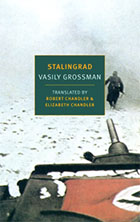READ RUSSIA PRIZE 2020 – WINNER
 Read Russia is pleased to announce the winner of the 2020 READ RUSSIA PRIZE. All the nominations received for this year’s award honored the breadth and diversity of work by Russian authors and their English-language translators and publishers – across a wide range of genres and from classic to contemporary writing.
Read Russia is pleased to announce the winner of the 2020 READ RUSSIA PRIZE. All the nominations received for this year’s award honored the breadth and diversity of work by Russian authors and their English-language translators and publishers – across a wide range of genres and from classic to contemporary writing.
Alexander Pushkin
Selected Poetry
Translated by Antony Wood
(Penguin Random House, 2020)
The READ RUSSIA PRIZE judges decided unanimously that this substantial yet varied collection of Alexander Pushkin’s lyric and narrative verse, translated by Antony Wood, represents a truly remarkable achievement. Wood’s bold and intelligent versions delight at every page with their masterful technique and fine poetic sensibility, conveying the tender, lyrical qualities of Pushkin’s verse, as well as their wit and humor, with a sustained excellence never previously attained in English. The lyric poems presented here are arranged in chronological order from 1814 to 1836, familiarizing the Anglophone reader with the range of Pushkin’s inspiration as he matured, travelled, and fell in and out of love. The rowdy young libertine poet of the early 1820s who described drunken revels and planned ‘priapic enterprises’ with willing females is represented here by several boisterous, irreverent verses: but readers will also meet the serious thinker who indignantly denounced his nation’s ‘shameful, deadly laws’ in enduring verses like “Liberty: An Ode” and “On Chaadayev.” Over the next decade and a half, Pushkin’s repertoire is enhanced by solemn, occasionally mystical poems such as “The Prophet,” “The Upas Tree,” and “The Drowned Man.” The final two sections of the anthology include, respectively, six narrative poems (including Pushkin’s Romantic masterpieces The Gypsies and The Bronze Horseman, and the playful satire Count Nulin) and four verse fairy tales, notably the Tale of Tsar Saltan. Wood’s rendering ably captures the humor and the pathos of these works, preserving meter, scansion, and even rhyme without distorting either the rhythm or the emotional power of the originals. Pushkin’s status as “our everything” remains sacrosanct in Russian culture: now, perhaps for the first time, Anglophone readers can appreciate why his poems enjoy unchallenged acclaim. Pushkin’s Selected Poetry represents Antony Wood’s crowning accomplishment of a lifetime dedicated to bringing Russian literature, and Pushkin’s verse in particular, to a wider English-speaking audience. The judges present their warmest congratulations on his success.
SPECIAL COMMENDATION
 Vasily Grossman
Vasily Grossman
Stalingrad
Translated by Robert and Elizabeth Chandler
(Harvill Secker and New York Review Books, 2019)
Vasily Grossman’s Stalingrad is one of the great war novels of the twentieth century. The scope of its literary achievement is dazzling: it chronicles a great nation’s delusions and aspirations, conveys its characters’ everyday life vividly and with psychological depth, and is ultimately monumental in its pathos and humanity. The novel’s translators, Robert and Elizabeth Chandler, met the daunting task of rendering in English a text that (due to Soviet censorship) lacks a final definitive Russian edition. Working closely with scholar Yury Bit-Yunan to edit Grossman’s surviving manuscripts, they restored censored and omitted passages while striving to return the work as closely as possible to the author’s first intention (even restoring the original title). In so doing, they have produced a work of the finest literary quality and also of lasting scholarly importance: this is supported by the extensive paratextual apparatus provided, including detailed endnotes; a full list of characters (necessary for any narrative on this Tolstoyan scale); maps and a timeline of the war in Russia; a translators’ introduction; an afterword clarifying the version history of the present English text; and further reading on both the Second World War in Russia and the experience of the defenders of Stalingrad. In highly recommending Robert and Elizabeth Chandler’s work, the READ RUSSIA PRIZE judges wish to draw attention to the translators’ impressive feat of research and critical insight, as well as their true dedication to Grossman’s artistic vision. Stalingrad is a novel of enduring importance: as a lost twentieth-century classic; as an account of a conflict that changed history; and as a celebration of the human spirit. Thanks to its translators’ intrepidity, it is now available in English to a global audience.
